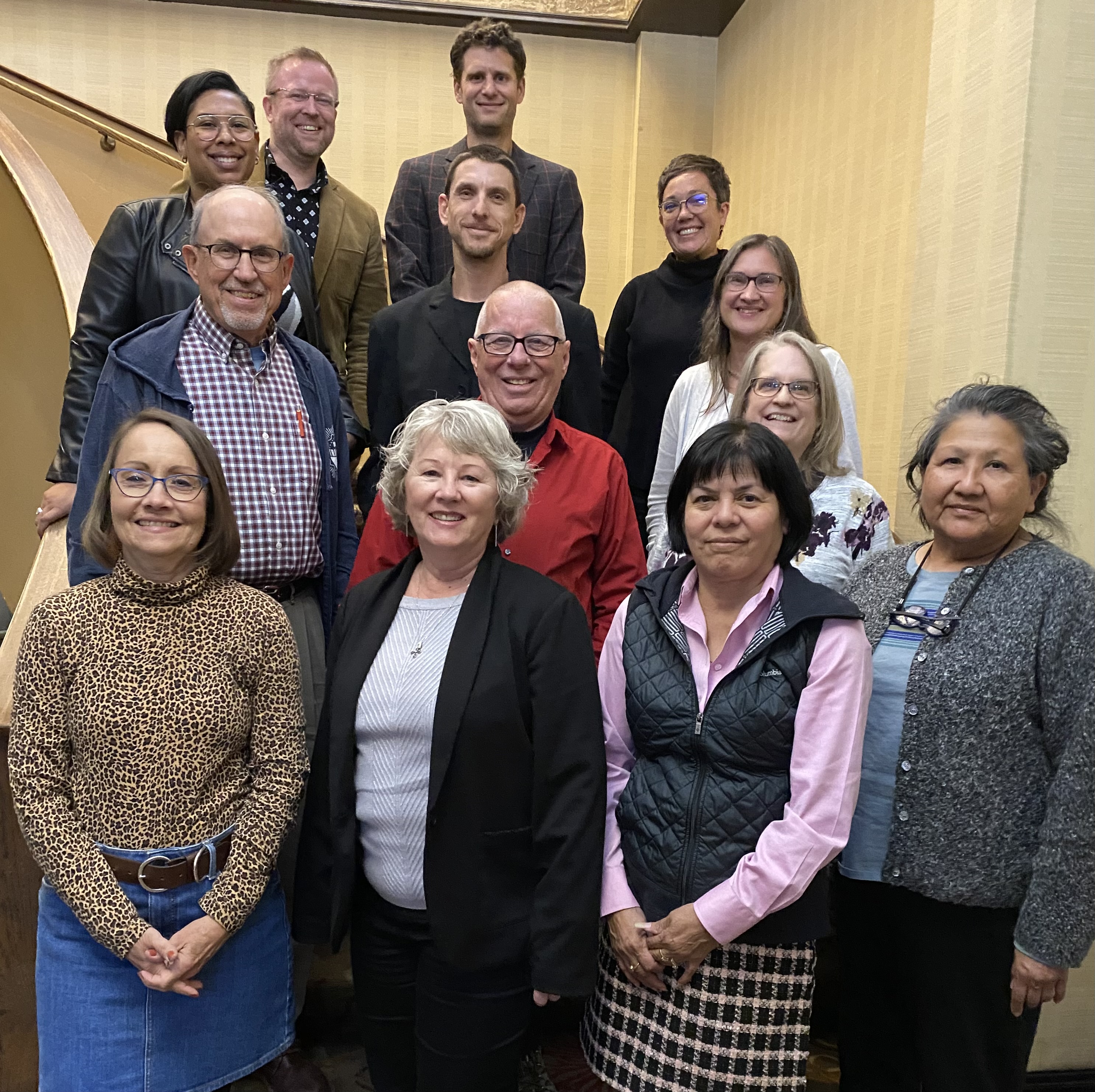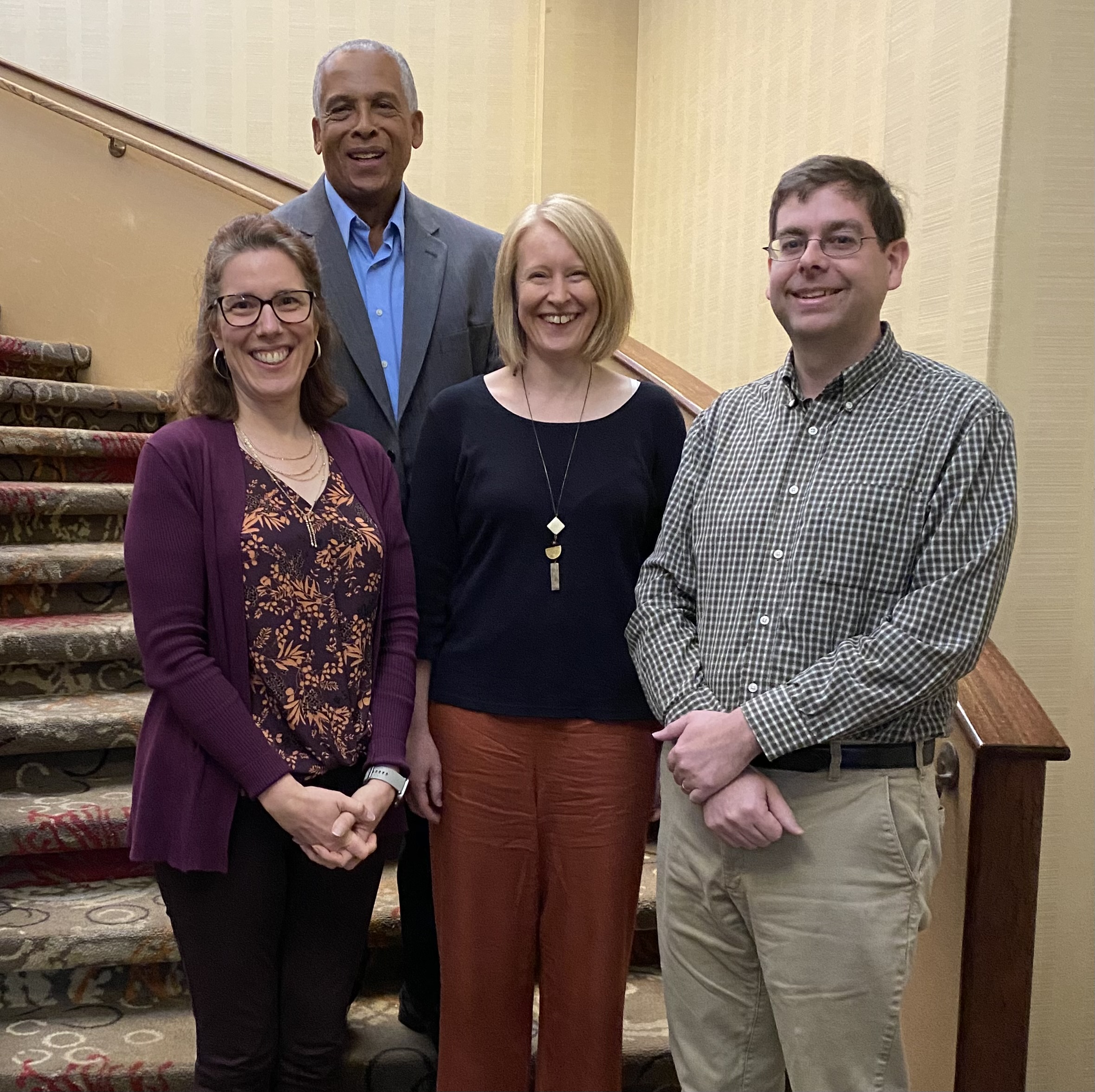
MC USA Executive Board members in Cleveland, Ohio, October 19, 2023. (Front row, left to right) Marty Lehman, Linda Dibble, Margie Mejia-Caraballo, Susan Hart (Second row) Mitch Kingsley, Phil Helmuth, Karen Zehr (Third row) Lesley Francisco McClendon, Todd Lehman, Rosetta Landis (Fourth row) Jon Carlson, Thomas Dunn and Emily Merolli. (Not pictured: Richard Aguirre, Chaiya Hadtasunsern and Jerrell Williams). Photo by Camille Dager.
The Mennonite Church USA Executive Board strengthened key relationships and discussed creative strategies for convention and revitalization at the first Executive Board meeting of the biennium Oct. 18-20, 2023, in Cleveland, Ohio.

Ohio Mennonite Conference leaders (from left to right) Paula Snyder Belousek, Ken Sims, Rachelle Lyndaker Schlabach and Andrew Blount. Photo by Camille Dager
Ohio Mennonite Conference welcomed the Executive Board and staff, as well as attending CEOs from Everence, MennoMedia, Mennonite Education Agency, Mennonite Mission Network, and MHS Association, with Ohio-themed gift bags and a catered lunch at the Crowne Plaza Cleveland Airport Hotel. Denominational leaders networked with OMC’s Ken Sims, moderator; Paula Snyder Belousek, assistant moderator; Andrew Blount, stewardship ministry chair; and Rachelle Lyndaker Schlabach, credentialing ministry representative, during lunch.
“Community is the center of our life together, so I’m always thankful for opportunities to establish and strengthen relationships throughout every part of MC USA,” said MC USA Moderator Jon Carlson, about connecting with OMC leaders.
Reimagining Convention
In response to delegate action calling for togetherness, the Executive Board began planning for MC USA’s 2025 biennial convention, reimagining it as a more intimate gathering focused on the biennial theme, Follow Jesus.
MC USA Executive Director Glen Guyton presented a report on the MennoCon23 convention. More than 1,400 people attended the convention in Kansas City, Missouri, in July 2023. Demographic shifts included an increase in the percentage of BIPOC attendees (14% of total) but a decrease in the percentage of youth. Children and youth represented 37% of attendees. In post-convention surveys, 97% of respondents rated the event positively, with speakers, worship and seminars ranked most favorably.
The event yielded a net deficit of $235,000, even though MC USA staff reduced convention costs by more than 10% over initial projections.
Proposed changes for MC USA’s 2025 convention include contracting with more cost-effective venues, reducing production costs, tightening up the convention schedule and raising participant registration fees.
Executive Board approves deficit budget
The Executive Board unanimously approved a budget plan for the fiscal year ending July 31, 2024, with a projected budget deficit of $180,000.
“Individual donations have been increasing, but not enough to keep up with our current level of programming,” Guyton explained. “Our reserves should be adequate for [this] fiscal year … but this pattern is not sustainable in the long term.”
Guyton outlined several key financial challenges impacting the budget, including shrinking membership across the denomination, lack of clear budget authority in the denominational structure and the ineffectiveness of the “first fruits” funding system.
Under the first fruits system, program agencies historically have provided the largest source of revenue for the Executive Board. However, first fruits giving has decreased by more than 20% over the past four years and currently represents just 50% of the Executive Board’s revenue.
Guyton presented the Executive Board with six key objectives of the Executive Board staff for the 2023-2025 biennium aimed at repositioning and revitalizing the denomination. These included re-envisioning MC USA as an inclusive Anabaptist faith community, providing more resources for leaders and reducing dependency on first fruits by creating an endowment fund for the historical archives.
Strengthening relationships
The Executive Board unanimously approved the “Mennonite Church USA Inter-agency Communication Plan,” a four-page strategic document aimed at strengthening collaboration and communication among the MC USA Executive Board and its accountable program agency boards (MennoMedia, Mennonite Education Agency and Mennonite Mission Network). The document was developed in collaboration with agency leaders.
The Executive Board also responded to the Delegate Assembly action that redesignated Everence and MHS Association as ministry partners by approving ministry partner agreements with both organizations. The boards of Everence and MHS Association will vote on the agreements at their respective upcoming meetings in the next few weeks.
In other business
The Executive Board also welcomed four new members – Rosetta Landis, Lesley Francisco McClendon, Phil Helmuth and Jerrell Williams (who participated via Zoom) – and devoted several hours to board development.
An ad hoc committee of the Executive Board (Lesley Francisco McClendon, Marty Lehman and Mitch Kingsley) provided a review of the Church Benefits Board, which sponsors and maintains various benefit plans for pastors and church workers, such as The Corinthian Plan and Mennonite Retirement Trust. The Church Benefits Board discussed the financial challenges of maintaining an equitable mutual aid-funded program and their work in response to the increasingly complex and changing healthcare landscape.
Looking ahead
The Executive Board will work on appointing a Resolutions Committee and redrafting the resolutions guidelines, as is customary for each new biennium.
Executive Board members also agreed to participate in the Intercultural Development Inventory, an assessment tool that measures one’s intercultural competency.
The next meeting of the Executive Board is tentatively scheduled for March 7-9 via Zoom.
Lea la versión en inglés aquí.
Mennonite Church USA is an Anabaptist Christian denomination, founded in 2002, and a recognized peace church. Members seek to follow Jesus by rejecting violence and resisting injustice. MC USA’s Renewed Commitments state the following shared commitments among its diverse body of believers: to follow Jesus, witness to God’s peace and experience the transformation of the Holy Spirit. MC USA is comprised of 15 area conferences and more than 470 congregations across the United States. MC USA is part of Mennonite World Conference, a global faith family that includes churches in 60 countries. Mennoniteusa.org
Written by Camille Dager.


Support the work and ministries of the MC USA Executive Board and staff, which, in turn, supports area conferences, congregations and members. The denominational staff is responsible for: resourcing conferences, planning conventions, managing the historical records of the denomination, and much more.

